Nitrogen-Filled Tires: Is It Worth the Cost?
June 8, 2021
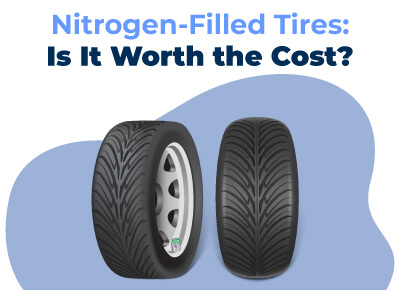

I am a serial entrepreneur and a consumer advocate. When I’m not helping car buyers, I love working on ventures that have a positive impact.
I run a cause marketing agency and serve on the board of Vayu Global Health where we are disrupting the medical industry and preventing the needless deaths of mothers and babies during childbirth.
Are you looking to get the best performance from your tires? Then you may want to consider the potential benefits of nitrogen-filled tires.
So what exactly are they, and what are all the benefits.
Here, we will explain what nitrogen-filled tires are and why they may be a smart choice for your vehicle.
Table of Contents
- What are Nitrogen-Filled Tires?
- How Do Nitrogen-Filled Tires Work?
- How Much Do Nitrogen-Filled Tires Cost?
- How Long Do Nitrogen Tires Last?
- Where to Fill Tires with Nitrogen
- Nitrogen-Filled Tires: Pros
- Nitrogen-Filled Tires: Cons
- Are Nitrogen-Filled Tires Worth The Cost?
- Best Car Deals by Category
- Frequently Asked Questions
What are Nitrogen-Filled Tires?
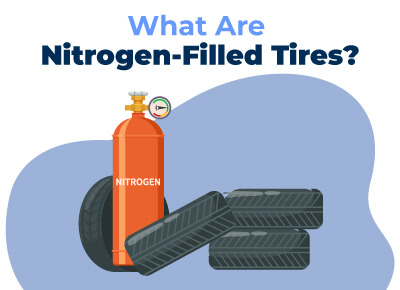 Most people fill their tires with air. Well, air is basically 78% nitrogen. Some race car drivers realized that they could enjoy better tire pressure by using pure nitrogen in their vehicle’s tires. The result is that a nitrogen-filled tire can take longer to lose pressure and provide better overall performance on the road.
Most people fill their tires with air. Well, air is basically 78% nitrogen. Some race car drivers realized that they could enjoy better tire pressure by using pure nitrogen in their vehicle’s tires. The result is that a nitrogen-filled tire can take longer to lose pressure and provide better overall performance on the road.
How Do Nitrogen-Filled Tires Work?
Air-filled tires are sensitive to changes in outside temperature. That’s because oxygen gas will expand in hot temperatures and contract in cold temperatures. This can cause air-filled tires to lose pressure in a shorter period of time. However, nitrogen-filled tires can better handle big swings in external temperatures. This allows nitrogen-filled tires to hold their pressure for a longer period of time.
Also, oxygen-filled tires are adversely affected by moisture. Nitrogen-filled tires are more resistant to the effects of water. Therefore, a nitrogen-filled tire will provide better pressure and less moisture. Since moisture is corrosive for the interior of a tire, a nitrogen-filled tire should last longer.
How Much Do Nitrogen-Filled Tires Cost?
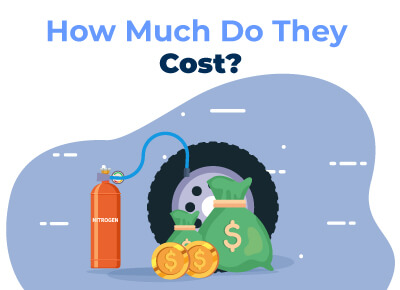
The cost of nitrogen-filled tires can vary depending on various factors. If you purchase a new vehicle with nitrogen-filled tires, it can cost anywhere from $70 to $175. For existing tires, the initial fill-up with nitrogen typically costs around $30 per tire. This initial cost is higher because the existing tires need to be purged of their oxygen through multiple nitrogen refills.
After the initial fill-up, refilling nitrogen-filled tires generally costs between $5 and $7 per tire. It's important to note that these prices are approximate and can vary depending on the dealership or service provider.
While nitrogen-filled tires may require a higher upfront cost compared to regular air-filled tires, they offer potential benefits such as better pressure regulation in extreme weather, improved tire maintenance, and enhanced performance.
However, it's essential to consider your specific vehicle type and driving needs to determine if the investment in nitrogen-filled tires is worth it for you.
Additionally, it's important to keep in mind that nitrogen can be harder to find compared to regular air, and the process of converting tires from air to nitrogen may take longer and incur additional expenses.
How Long Do Nitrogen Tires Last?
A nitrogen-filled tire will last about three to four months before it will require another refill of nitrogen. Overall, however, you will refill your nitrogen-filled tires less often than you would with air-filled tires.
Where to Fill Tires with Nitrogen
There are several places you may be able to go to fill your tires with nitrogen. Here are some places to check out:
- Nationwide tire centers. Many tire centers can fill yours with nitrogen, but they may charge a fairly high fee.
- Dealerships. Some dealerships will fill new vehicle tires with nitrogen. This service may or may not be included with your purchase.
- Discount superstores. Discount superstores with auto centers may sell tires and fill them with nitrogen.
Where Can I Get a Free Nitrogen Tire Refill?
While there are several places you can go to fill tires with nitrogen, not all will do so for free. The most likely places you can get free nitrogen tire refills are discount superstores.
For example, with your Costco membership, you can use their nitrogen tire refill stations for free.
Nitrogen-Filled Tires: Pros
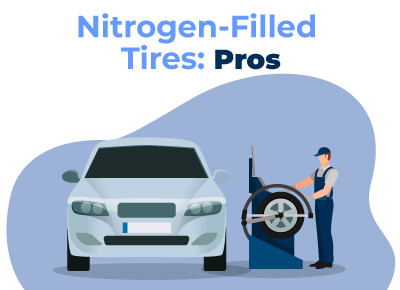 There are a number of excellent reasons to consider nitrogen-filled tires. Here are the top three reasons to consider them for your vehicle:
There are a number of excellent reasons to consider nitrogen-filled tires. Here are the top three reasons to consider them for your vehicle:
Provide Better Pressure Regulation in Extreme Weather
A nitrogen-filled tire will better resist the wild swings in weather that can adversely affect an oxygen-filled tire. Therefore, if you live in an area with extreme hot or cold conditions, then you may experience better tire pressure regulation with nitrogen.
Allows for Better Tire Maintenance
A nitrogen-filled tire can hold its pressure better, and it is also more resistant to moisture corrosion. Therefore, the tire should be able to last longer and require less tire pressure maintenance.
Can Provide Better Performance
Performance vehicles should experience better overall handling, acceleration, and performance with a nitrogen-filled tire with its better-regulated pressure and better resistance to moisture and temperature swings.
Nitrogen-Filled Tires: Cons
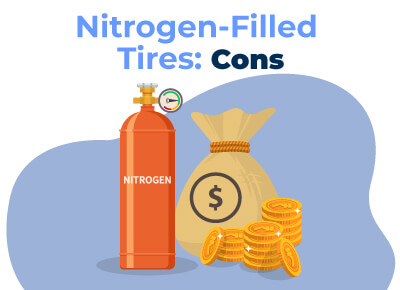 Before you decide to fill your vehicle’s tires with nitrogen, you should consider some potential downsides:
Before you decide to fill your vehicle’s tires with nitrogen, you should consider some potential downsides:
Can Be More Expensive
Since nitrogen gas will be rarer than oxygen gas, you should expect to pay more to fill your tires with nitrogen. The average cost to fill your tires with nitrogen is about $30 per tire the first time you fill your tires with air.
Nitrogen Air Is Harder to Find
When it comes to filling your tires with oxygen, you simply need to visit your local gas station. Nitrogen is different. You may have to go to a dealership to get nitrogen filled in your tires.
Longer to Fill a Nitrogen-Filled Tire
If you are looking to convert your tire from air to nitrogen, you will have to fill the tire several times with nitrogen. That’s because the tire needs to be completely purged of oxygen. The process will not only take several times longer versus air, but it will also be more expensive because of the multiple refills.
Are Nitrogen-Filled Tires Worth The Cost?
Yes, nitrogen-filled tires are more expensive and more time-consuming. However, if you own a performance vehicle or a vehicle with expensive tires, then the investment in nitrogen-filled tires may be worth it.
If you drive a non-luxury vehicle and performance is not a priority, then the higher cost of nitrogen-filled tires may not be worth it for your vehicle.
Best Car Deals by Category
Frequently Asked Questions
Can I put air into a tire already filled with nitrogen?
While it is not dangerous to put air in a tire filled with nitrogen, you will lose the effectiveness that a tire filled with pure nitrogen can offer. Therefore, it is not recommended to fill a nitrogen tire with air. Also, if you want to have a pure nitrogen tire in the future, you will have to purge the oxygen from the tire which will cost more.
What’s the difference between nitrogen-filled tires and air-filled tires?
Nitrogen-filled tires are designed to be less resistant to the effect of temperature on a tire. Also, nitrogen-filled tires can maintain proper pressure for a longer period of time, resulting in a longer life for the tire. Finally, nitrogen-filled tires are more resistant to a build-up of moisture in the tire, leading to corrosion.
How can I tell if I have nitrogen-filled tires?
Vehicles that have green valve caps with the word nitrogen or the N2 symbol are filled with nitrogen. If you have your vehicle filled with nitrogen for the first time, the dealership, tire center, or discount store will provide the green valve caps. These green valve caps are designed to prevent people from accidentally placing air inside of the tire.
Are nitrogen-filled tires safe?
Nitrogen-filled tires are as safe as air-filled tires. Nitrogen is not flammable and will not cause your tires to explode.
Will nitrogen-filled tires work with my tire pressure monitoring system (TPMS)?
Your vehicle will be able to read the pressure inside your tire whether you are using air or nitrogen.
How much nitrogen should I put in my tires?
You can put the same amount of nitrogen in your tires as you would air. Be sure to check your vehicle’s owner’s manual to detect the exact amount of nitrogen your tires will require.
Will nitrogen tires work in the wintertime or the summertime?
Yes. In fact, nitrogen-filled tires should work better than air-filled tires because they will not expand or contract as much as an air-filled tire.
Posted in Car Buying Tips |




